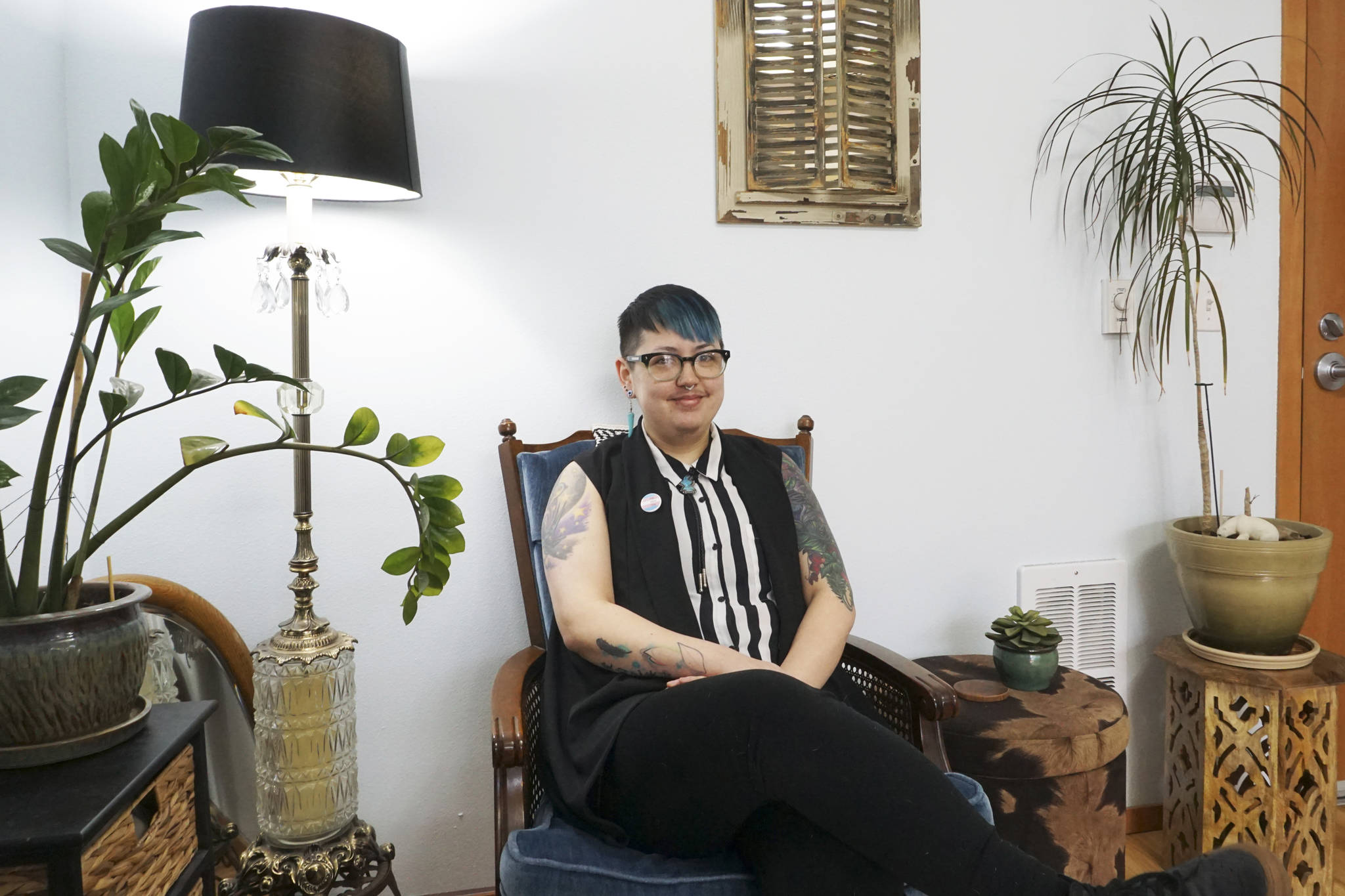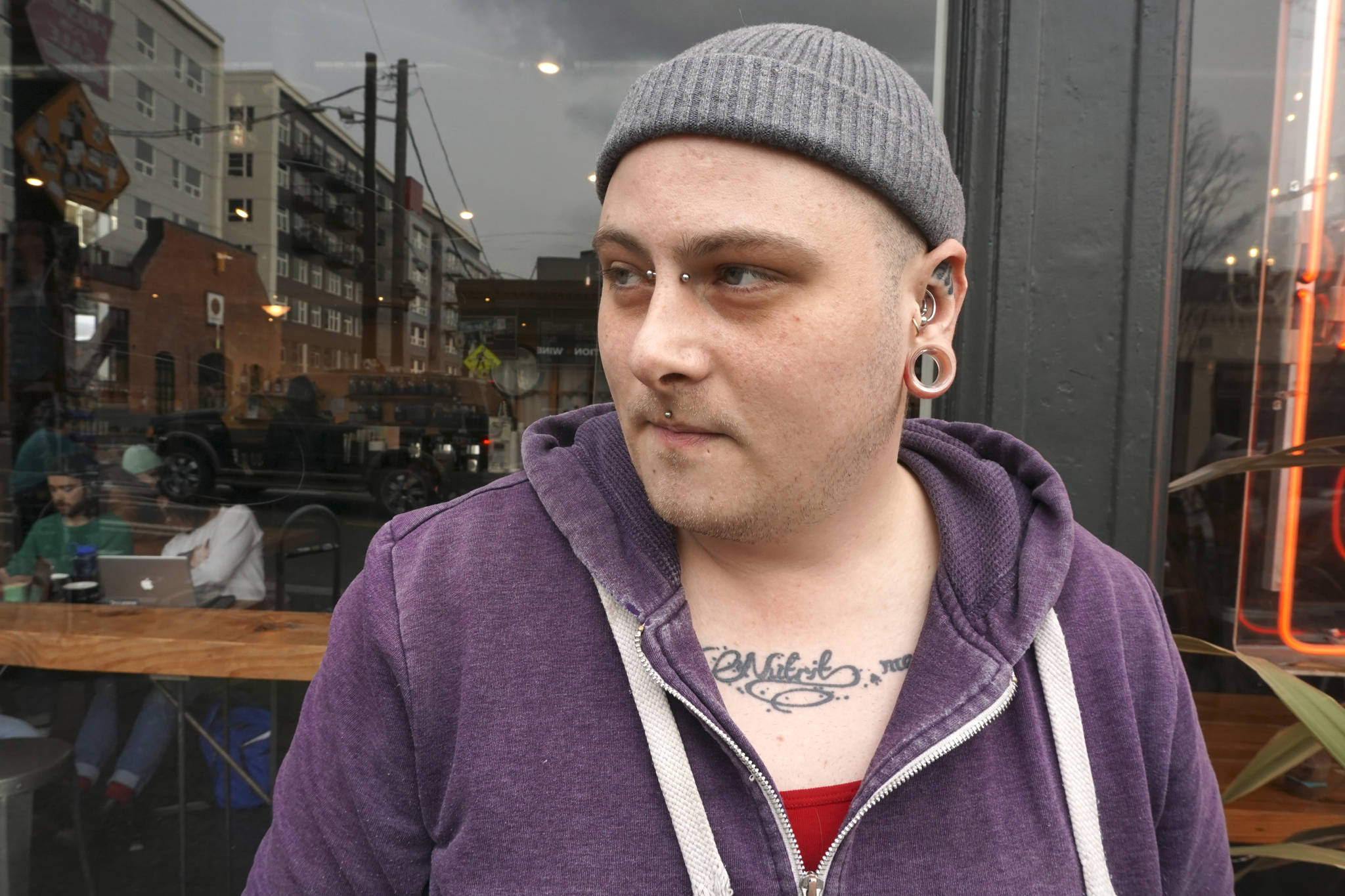Every day that barber Adi Chen wakes up, they are struck by the undeniable recognition that their internal and external states are unaligned. The realization has been a sobering one that’s taken a lifetime to reconcile. It’s meant cycling through friends and therapists, only to retire them when they don’t work. “I’m comfortable in my body,” says Chen, their voice quivering, “but there are so many things about my … mind and my soul that don’t fit in my body.” Tears rose to their eyes, magnifying the glare of their black-rimmed glasses.
Their journey to self actualization has been as much interpersonal as physical—an acknowledgment of the middle space that they occupy. “People say ‘transition’ like it’s something that you do, but for me, it’s something that you live,” they explained. “There’s never an end point.” Chen adjusted themselves in a wooden chair with bluish-gray upholstery, tugging on a black vest that revealed a colorful floral arrangement tattooed on their left arm. Chen’s shortly cropped, dark hair gave way to angled bangs that were dyed blue.
Everyday is a coming out of sorts for Chen, a 36-year-old mixed race, femme trans boy. Yet they refer to it as “living out loud,” engaging in a trial and error of pronouns, community, and discussions. They have reason to be selective.
Chen started referring to themselves as “they” and “them” in 2014, before it was common for people to introduce their preferred gender pronouns in the same breath as their name. But the term “they” didn’t feel complete, so Chen started using male pronouns. On some days, Chen uses “they” and “he” interchangeably to describe themselves. “I like them to kind of both be thrown into one sentence, and be confusing, and fluid, and back and forth, because that’s how I feel about my gender.” And thanks to a recent change in state law, Washington will also officially recognize this fluidity.
Chen started the tedious process of changing their identity in the eyes of the state about a year ago. First, Chen legally changed their first name to a more gender neutral one that’s a combination of their first and middle initials, and adopted their grandmother’s maiden name. Since filing a petition with the district court to change their name in June, they have also changed it on their social security card, which they anticipate receiving in a couple of weeks. But the process is barely over. Chen still needs to change their name on a bevy of other documents including about five professional licenses, and their health insurance.
Yet all of this work is worth it to Chen. Soon, they plan to officially change their gender designation to also reflect their non-binary identity in the eyes of the state.
On January 27, the State Department of Health (DOH) began allowing non-binary people like Chen to change their gender designation to “x” on their Washington birth certificates. The rule expands a previous state statute that only allowed people to change their birth certificate to male or female. The third option is designed for people who identify as intersex, transgender, Two-Spirit, and more.
“It’s really about wanting your core identity document to match your lived experience,” said Christie Spice, director of the Center for Health Statistics at the Department of Health.
A birth certificate is a foundational identity document that is used to obtain other forms of identification including a driver’s license or a passport. While having a third designation doesn’t guarantee that other agencies will make those changes, DOH considers it a step in the direction of aligning people’s gender designation with their identity to promote health equity.
The department decided to make the change after taking inventory of longstanding policies and procedures. In reviewing the 10 years of changing birth certificates from female to male and vice versa, DOH staff saw opportunities to make improvements. Then last year, individuals started making requests to include a non-binary gender designation. “Allowing sex designation change on the birth certificate reduces the risk that the person is going to experience harassment and discrimination when they use that document in their lives,” said Spice.
In order to make the request, an adult needs to submit an application form that is signed and notarized to indicate their new gender designation. The procedure is free, but receiving a copy of a new birth certificate costs $20 under state law. If the information on the request form is complete, it customarily takes two days to process a gender change request on a birth certificate.
The new birth certificate rule change removes the requirement that adults seeking to make the change provide a doctor’s letter to do so. Although minors still need medical attestation to change their gender designation, the new policy expands the list of professionals to include mental health counselors, family therapists, and naturopathic physicians, among others. However, parents wanting to avoid assigning a gender for their babies will have to wait, since the rule change only applies to existing birth certificates and not ones for newborns.
The D.C.- based group National Center for Transgender Equality (NCTE) worked with a coalition of mostly Washington state-based organizations, including advocacy group Gender Justice League, to help move the Washington regulation forward, and consulted with the DOH as it considered the policy change. NCTE State Policy Counsel Arli Christian said that the change grants non-binary people greater educational and career opportunities, as well as helps increase their safety. “When an ID document has the incorrect gender, it exposes trans people to a range of negative outcomes,” Christian said. “They could get denied employment, or housing, or health and public benefits. It could possibly cause verbal harassment or physical violence.”
A 2015 survey showed that 25 percent of transgender respondents in the U.S. reported experiencing verbal harassment when they presented any form of identification that didn’t reflect their gender presentation, and 2 percent said that this caused them to be assaulted or attacked. Ridding the barrier of a healthcare provider’s note for adults to change their gender designation is also significant because many people might not have access to a doctor or insurance.
As of Feb. 26, the DOH had changed five birth certificates to the third gender option since the rule change went into effect.
When Chen learned about Washington’s adopted rule change in December, a lot of their clients and friends began texting them about it, “because I’m pretty out.” There was a sense of relief when they learned about it. “I feel like it finally recognizes who I am, because neither of those markers ever fit,” Chen said, referring to male and female identities. They plan on taking advantage of the new rule once they’ve finalized their name change on other legal documents.
As Chen sits in their Wallingford barber shop surrounded by houseplants and natural light, they reflect on the long and winding journey without a fixed destination that got them to this point. Chen’s fluid perception of gender started to form as a child in a King County private school, where they didn’t need to wear uniforms, but students were expected to conform to strict gender roles. The lack of uniforms allowed them the freedom to express themselves, which meant wearing baggy clothes that hid their body and helped them exist in a space that was more gender neutral. Yet, they struggled to replicate that in other aspects of their life. In their late teens, Chen began joking that they were “third” gender, and wished that English lacked gender pronouns similar to American Sign Language. Then in public high school, Chen started meeting more artistic students who wore makeup regardless of their gender and experimented with their hair color and clothes. “That’s when I discovered that there were other ways to express gender than what the fashion industry tells you.” But Chen believes that gender transcends clothing and physical appearance; feminine does not equate to female, nor does masculine to male.
“I never felt like the ‘M’ fit me and I never thought that the ‘F’ fit me, so it only makes sense to go with another option. I didn’t think that would ever be available,” Chen said.
Harley-Quinn Black, a Metropolitan Market cashier, also thinks the new birth certificate rule is critical. Black started the process of changing their birth certificate about two weeks ago, after they learned about it via a friend’s Facebook post. As Black relayed a lifetime of questioning their identity, the 31 year old crossed their arms on Kaladi Brother Coffee’s wooden table, exposing an array of tattoos that lined both of their arms. A metal piercing on the bridge of their nose rested between sea green eyes.
Black came out as non-binary about a year ago, after several years of wondering if they were queer or homosexual. They realized that “it wasn’t really about my sexuality; it was about my gender itself.”
As the first stop on their road to self discovery, Black began taking estrogen and testosterone blockers about four years ago. While the hormones flowed through their body, Black felt more themselves than they ever had before, but they soon became depressed. Over a year after beginning the treatment, Black found themselves in between jobs and was forced to stop taking the hormones because of their limited finances. The rough patch offered a moment of reflection for Black to reconsider their preconceived notions about gender.
“It’s strictly in the middle between both realms of male and female,” Black said about their own gender fluidity. Identifying as non-binary felt freeing. “I didn’t have to put on a facade of ‘I have to put on three layers of makeup to look pretty,’ or I don’t have to be super thin. I didn’t have any of those expectations leading into being non-binary.”
Black doesn’t think that changing their gender designation on their birth certificate will transform anything for them personally, because they are finally starting to feel comfortable with who they are. Instead, Black hopes that their decision will create greater visibility of non-binary folks and help further advance the law. They want the state to allow gender-neutral designations on driver’s licenses and for parents to stop choosing gender identities for their children one day.
But not everyone was satisfied with the rule change. Although the DOH received many supportive remarks in the more than 1,000 public comments on the rule change, some residents found it unnecessary. Joseph Backholm, president of the nonprofit Family Policy Institute of Washington, opposes the rule change because he believes that it doesn’t reflect reality. “Personal identification documents weren’t created to harass the gender dysphoric but to allow the world to distinguish one person from another for the myriad reasons that is necessary,” Backholm said in an email to Seattle Weekly. “If the government gives people the ability to create their own official identity regardless of reality, the purpose of identification documents becomes moot.”
Yet studies show that gender nonconformity is gaining greater acceptance in society. A 2017 GLAAD report showed that 12 percent of millennials identify as transgender or gender nonconforming, double the amount reported by the previous generation. Evolving social norms are also reflected in the increased requests to change gender designations on birth certificates throughout the years: DOH received 109 requests in 2015, 235 in 2016, and 286 last year.
DOH’s rule amendment also mirrors a national trend. The District of Columbia was the first jurisdiction in the nation to allow its residents to choose gender neutral designations on driver’s licenses and other identity documents last summer. Oregon followed soon thereafter. Last year, California Governor Jerry Brown signed a law adding a non-binary option on birth certificates and other state IDs that will go into effect on Sept. 1, 2018.
Chen wants people who are considering taking advantage of the rule change to know that they aren’t alone: “You are valid. Your gender is valid.” It’s something many have been waiting to hear their entire lives.
mhellmann@seattleweekly.com









